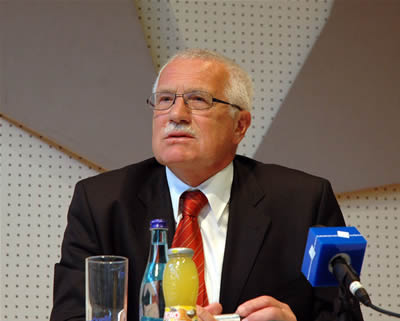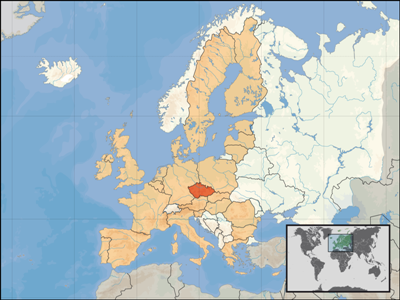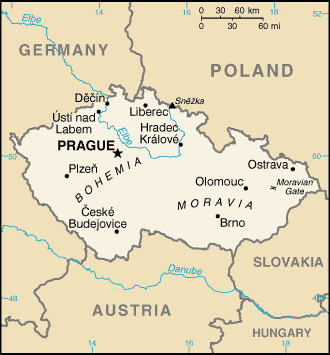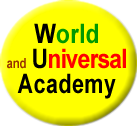|
 |

|
|
|
Václav Klaus |
The second President of the Czech Republic |
Le second Président de la République Tchèque |
| |
|
|
| |
Václav Klaus (born 19 June 1941, Prague) is the second President of the Czech Republic and a former Prime Minister of the Czech Republic (1992-7). This right-wing economist is generally ranked among the most important Czech politicians since the fall of the communism.
Personal life
Klaus grew up in the residential Vinohrady neighborhood of his native Prague and graduated from the University of Economics, Prague in 1963; he also spent some time at universities in Italy (1966) and the United States (1969). During the Prague Spring he published articles on economics in the pro-reform, non-communist magazine Tvář. He then pursued a postgraduate academic career at the (state) Institute of Economics of the Czechoslovak Academy of Sciences, which he left (he says, being forced out for political reasons) for the Czechoslovak State Bank in 1970; Klaus then joined the perestroika-minded Prognostics Institute of the Czechoslovak Academy of Sciences in 1987. In 1995, as Prime Minister, he was awarded a degree of Professor of Finance from his alma mater and is thus often called "Mr Professor" by his admirers.
Václav Klaus is married to Livia Klausová, an economist born in Slovakia. They have two sons, Václav (a private secondary school headmaster) and Jan (economist), and five grandchildren. In summer 2002 he was photographed by a tabloid as having a "special relationship" with airline stewardess and economy student Klára Lohniská; this was treated by both the press and the public with remarkable sympathy.
In youth, Klaus used to play basketball; he still is an avid tennis player and skier.
Since 1990, Václav Klaus published over 20 books on various social, political, and economics subjects, generally collections of articles and speeches; the most recent of these are three yearbooks of his presidential activities. Václav Klaus is a member of the Mont Pelerin Society. He has published articles in the free market-oriented Cato Journal and elsewhere.
Rise to Prime Ministership, and fall
Václav Klaus entered politics soon after the Velvet Revolution in 1989. As a member (and since October 1990, chairman) of Civic Forum he became the federal Minister of Finance. In April 1991 Klaus co-founded Civic Democratic Party (Občanská demokratická strana, ODS), the strongest and most right-wing of the post-Civic Forum splinter parties. He remained its chairman until the autumn of 2002.
His vocal enthusiasm for the free market economy as exemplified by Friedrich Hayek and Milton Friedman and practised by Margaret Thatcher and Ronald Reagan, together with his stated belief in the Adam Smith's "Invisible Hand", soon became well known (and also often criticised) and Klaus became a natural father of the Czechoslovak economic transformation. Others agreed with his free-market concepts, but pointed out that during his premiership he neglected the importance of law (in particular battling corruption), largely ignored the enforcement of property rights on stock market, and that his pet project, the voucher privatization, was poorly executed and didn't bring the economy responsible owners it needed.
In June 1992, ODS won the elections in the Czech Republic with a reform program; its counterpart in Slovakia was Vladimír Mečiar's nationalistic Movement for a Democratic Slovakia. It soon became apparent that Slovak demands for increased sovereignty were incompatible with the limited "viable federation" supported by the Czechs (most vehemently by then-president Vaclav Havel); both leaders assumed the premiership in their respective polities and quickly agreed, without consulting the electorate, on a smooth division of Czechoslovakia and its assets under a caretaker federal government.
Klaus continued as Prime Minister of the Czech Republic after the 1996 election, but ODS's win was much narrower and his government was plagued by instability, economic problems, and increasingly visible corruption. He had to resign in the autumn of 1997 after a government crisis caused by an ODS funding scandal, an event later called "Sarajevo Assassination" (sarajevský atentát) by his sympathisers, as it happened during his visit of Sarajevo at that time.
Czech President Václav Havel publicly referred to Klaus' economic policies as "gangster capitalism" in reference to the widespread corruption surrounding his policy of voucher privatization and his côterie of close allies such as the "entrepreneur" Miroslav Macek or StB honcho Václav Junek.
ODS lost the parliamentary election in 1998 and Miloš Zeman, chairman of the Czech Social Democratic Party (ČSSD), succeeded Klaus as prime minister. The two closed an "opposition agreement" (opoziční smlouva) and so Zeman's minority government was supported by ODS: Klaus became the chairman of the lower house of the Parliament, while Zeman's pre-electoral promise of "clean government" sailed into the sunset.
ODS was again defeated in the elections of June 2002; after long hesitations, Klaus, supposedly under pressure from his lieutenants, resigned as party chair in the autumn and was elected honorary chairman by a unanimous vote.
Presidency
Klaus became the second president of the Czech Republic. His approval rate has been as high as 82 percent. However, his road to the successful presidency wasn't easy.
Having lost second General Election in a row, Klaus' hold on the ODS appeared to become weaker, and he announced his intention to resign from the leadership and run for president. This was taken by many to be a graceful way of retiring. He was elected President of the Czech Republic by secret ballot in a joint session of both chambers of parliament on February 28, 2003, thus succeeding Václav Havel, who had been one of his greatest political opponents since the division of Czechoslovakia. Klaus was elected after two failed rounds of voting earlier in the month, only in the third turn of the election when both chambers vote on two top candidates jointly, by 142 votes out of 281 with, notably, support of the Communist Party of Bohemia and Moravia whose parliament club he visited before the election. He was aided in this by the governing coalition which, buffeted especially by feuds within ČSSD, was unable to agree on a common candidate to oppose him; apparently also a faction within ČSSD unsatisfied with the Prime Minister Vladimír Špidla and reportedly even a few right-leaning members of Christian and Democratic Union - Czechoslovak People's Party voted for Klaus. Klaus threatened to walk out of a press conference in France during 2003 when asked by a journalist to explain how he could reconcile asking for and receiving communist votes in the election for President with his previous (and subsequent) anti-communist positions. The price for these votes became clear when Klaus invited the Communists' leader to participate in meetings with the President for the first time since 1990. However, during 2005 and 2006 he stated that he would refuse to appoint a cabinet which depended on communist support either directly or indirectly.
Václav Klaus still has many opponents, and his percieved arrogance is among the most benign of their criticisms: They depict him as a narrow-minded pragmatist interested only in lecturing about the technology of power and textbook economic precepts while practicing policies and approaches that are entirely contradictory but materially convenient to his friends. Beside his governments' mistakes and pervasive corruption, one of the most contested issues is his relation to Communism, both in the past and as a strong modern-day political party: Klaus has published articles praising "the grey zone" of the majority of ordinary people who passively endured the regime, while dismissing the importance of the small minority of dissidents like Havel for their "haughtiness".
In another article he has declared himself a "non-communist" but not an anticommunist, which he says he rejects as cheap and superficial posturing (even though he ran two election campaigns against ČSSD using the traditional 'red scare'). Klaus is often considered to be a Eurosceptic although he prefers the term "eurorealist".
Klaus' Euroscepticism - apart from his libertarian attitude to economics - is the defining policy position of his presidency, and he includes criticism of the EU in most public statements. During various state visits in Europe this has led to his hosts viewing his statements as insulting and beyond proper diplomatic behaviour - Latvia and Finland being two examples of this. He has described accession to the Union as representing the end of Czech sovereignty. In spite of this and his tendency to express his opinion on all issues, clearly sensing the overwhelming public mood in favour of joining (77% voted yes), he failed to advocate a side in the 2003 accession referendum.
Subsequently he has maintained a steady barrage of articles and speeches against the EU and even ensured the publication in Czech of a work by the Irish Eurosceptic Anthony Coughlan whose personal political career includes extreme-left allignments and a record of campaigning against every EU Treaty. In 2005 Klaus called for the EU to be "scrapped" and replaced by a free-trade area to be called the Organisation of European States. In spite of this he has said, when challenged, "please don't claim that I'm in favour of just a free trade zone." This has confirmed his unwillingness to justify his more extreme pronouncements when confronted. In 2005 he informed a group of visiting US politicians that the EU was a "failed and bankrupt entity".
He has reversed Havel's policy of avoiding many countries like China. His first major visit was to Russia and in 2006 he hosted Vladimir Putin in a style which was described by many as borderline-sycophancy including using Russian to converse with him. It was noted that, in spite of his statements while in the U.S., his position on most foreign policy matters over the last decade has been closely alligned with that of Russia.
Klaus's popularity in public opinion polls grew rapidly in the first half of 2003, supported by blanket "soft" coverage from the country's largest newspapers, contrasting with an unpopular government and growingly populist rhetoric. It has remained between 60% and 82% since then.
Klaus is a global warming skeptic who considers the warnings about the anthropogenic global warming to be a fatal mistake of the present era. He has also criticized the IPCC climate panel as a group of politicized scientists with one-sided opinions and one-sided assignments. Other top-level politicians do not expose their doubts about global warming because "a whip of political correctness strangles their voices."
Despite his pre-election promises, he exercises his power to veto the laws rather more often than Havel, generally for ideological reasons. Among these was also registered partnership act; however, his veto was overturned by the parliament in March 2006, and the Czech Republic became the first post-communist country to grant legal recognition to same-sex partnerships. |
|
FRANÇAIS |
| |
Václav Klaus (prononcé "Vaatslav Klaos"), né le 19 juin 1941, est le second Président et un ex-Premier ministre d'une République Tchèque libérée du joug communiste en 1989. Il fut l'un des hommes politiques les plus marquants de cette période, en particulier après la scission d'avec la Slovaquie (1993); reflétant son électorat, il en reste un des plus populaires.
Enfance et études
Klaus, né à Prague, dans le quartier de Vinohrady, sort diplômé de l'École supérieure d'économie de Prague en 1963, et poursuit ses études en Italie (1966) et aux États-Unis (1969). Il rentre ensuite, volontairement, en pleine "normalisation" communiste consécutive à l'occupation soviétique de 1968, à l'Institut d'économie de l'Académie des Sciences tchécoslovaque (institut d'état), qu'il quitte pour rentrer à la Banque d'État de Tchécoslovaquie en 1970, plus particulièrement chargé du secteur stratégique des devises "dures". Il rejoint en 1987 l'Institut des prédictions de l'Académie des Sciences de Tchécoslovaquie, institut d'état aux tendances politiques prétendument "réformatrices". En 1995 son alma mater (l'école supérieure d'économie de Prague) lui décerne le titre de Professeur de Finance, que ses nombreux admirateurs lui prodiguent profusément.
Il n'est néanmoins pas inutile de rappeler que seuls les personnes (au minimum) "approuvées" par le régime communiste pouvaient, avant 1989, obtenir l'accès aux études (surtout à l'étranger) ou aux professions sensibles, à fortiori à celle d'économiste spécialisé dans les devises dures.
Carrière politique
Václav Klaus entre en politique peu après la Révolution de velours que connut la Tchécoslovaquie en 1989. En tant que membre - très récent - du Forum Civique, qui manquait cruellement de technocrates aux relations tentaculaires, il est nommé ministre fédéral des finances de la Tchécoslovaquie. En avril 1991, il devient membre fondateur du parti ODS (Obcanska demokraticka strana) ou parti civique-démocratique, le plus puissant et le plus à droite des partis issus du Forum Civique d'une part, et de l'ancienne élite communiste reconvertie dans les affaires, de l'autre. Il restera président de l'ODS jusqu'à l'automne 2002.
En juin 1992, l'ODS gagne les élections en République tchèque avec un programme réformateur alors qu'en Slovaquie c'est le parti nationaliste HZDS (Hnutie za demokratické Slovensko, mouvement pour une Slovaquie démocratique) de Vladimír Mečiar, ancien boxeur et membre important du StB (police secrète politique). La Fédération entre la République tchèque et la Slovaquie ne survit pas aux divergences politiques et les deux chefs de gouvernements s'accordent, sans consultation populaire, sur la fin de la Fédération et le partage de ses avoirs. Klaus et Mečiar créent un gouvernement fédéral provisoire qui doit se charger de diviser le pays, ce qui survient, malgré l'opposition farouche du président de l'époque Vaclav Havel, au premier janvier 1993.
Klaus reste à son poste de Premier ministre dans la nouvelle Tchéquie après la scission du pays et se voit réélu en 1996, même si l'ODS subit une perte d'influence au Parlement et que le gouvernement éprouve de plus en plus de difficultés à régler les problèmes économiques. À l'automne 1997, Klaus et son gouvernement doivent démissionner, officiellement suite au scandale du financement de l'ODS.
L'enthousiasme affiché de Václav Klaus pour l'économie de marché théorisée par Friedrich Hayek ou Milton Friedman, son admiration dithyrambique pour l'application qu'en ont fait Margaret Thatcher, Ronald Reagan ou George H. W. Bush est souvent critiquée même par les tenants de cette idéologie, qui "regrettent" entre autres son manque d'intérêt pour la mise en place d'un cadre légal, notamment en ce qui concerne la lutte contre la corruption: parmi les nombreuses citations de Klaus, l'on relèvera ainsi l'exemplaire "je ne connais pas d'argent qui soit sale".
L'ODS perd les élections législatives en 1998 et Miloš Zeman, président du parti social-démocrate tchèque (ČSSD) remplace Klaus au poste de Premier ministre. Le ČSSD est cependant minoritaire, et, pour gouverner, doit passer un "accord d'opposition" (sic) avec l'ODS. Klaus devient ainsi président de la Chambre basse du Parlement (Poslanecká sněmovna), et les opérations "mains propres" précédemment promises par Zeman passent à la trappe..
Aux élections de juin 2002, l'ODS est encore battu. Après avoir tergiversé, Klaus démissionne de son poste de président de l'ODS, probablement "aidé" par les caciques d'un parti qui vient d'essuyer plusieurs défaites consécutives. En contrepartie, Klaus est élu à l'unanimité président d'honneur de l'ODS .
Après plus de cinq années passées dans l'opposition, Klaus est élu Président de la République tchèque par les deux Chambres du Parlement (et non au suffrage universel) le 28 février 2003, remplacant à ce poste Václav Havel qui fut l'un de ses plus ardents opposants depuis la scission de 1993. Cette élection fut particulièrement révelatrice car l'ODS ne disposait pas des voix suffisantes pour faire élire Klaus: mais après deux tours infructueux, Klaus reçut 142 voix sur 281. Le CSSD, majoritaire, miné par les rivalités, ne trouvait pas de candidat commun; avec l'aide du groupe communiste, qu'Havel avait ostracisé, de quelques dissidents du ČSSD et même d'éléments des chrétiens-démocrates de la KDU-ČSL, Klaus rassembla les voix nécessaires pour être élu.
Critiques
Václav Klaus reste l'objet de nombreuses critiques; parmi les plus répandues, l'on peut citer son arrogance, son application ostentatoirement rigide de certains dogmes économiques, sa constante et active tolérance de la corruption, ses liens très étroits avec de nombreux anciens du Stb comme par exemple Vaclav Junek (actif en France dans les années 1980 avant de devenir membre du comité central du parti communiste), ainsi qu'un passé aux nombreuses zones d'ombre. Les positions plus qu'ambivalentes du Klaus d'après 1989 sur le communisme, à la fois dans l'histoire nationale et comme parti actuel, font également l'objet de critiques, et ce notamment de la part de la petite minorité de Tchèques que constitue les anciens dissidents. Le président a ainsi publié à ce propos des articles louant la « zone grise » de la majorité de la population (lui valant ainsi l'estime reconnaissante de celle-ci) et ses liens avec le communisme, tout en condamnant les dissidents comme Havel pour leur "condescendance"; dans un autre article, Václav Klaus se déclare « non communiste » mais pas anti-communiste, qualificatif qu'il rejette comme "facile et superficiel". Cela ne l'empêchera pas, chaque fois que cela lui sera utile, de dénoncer l'appartenance passée au parti communiste tchécoslovaque de certains de ces adversaires politiques, comme Pavel Telicka.
Ce dernier et les partisans de l'intégration européenne reprochent à Václav Klaus ses envolées europhobes et sa recherche de la satisfaction facile de l'électorat, ce aux dépens d'un projet à long terme pour la République tchèque. Václav Klaus a particulièrement marqué sa différence lors de l'adhésion de la République tchèque à l'Union européenne le 1er mai 2004 en bannissant le drapeau européen du château présidentiel. Il a également multiplié les déclarations contre la Constitution européenne.
Les déclarations de Klaus qualifiant de "centre de réhabilitation par le travail" un camp de concentration tchèque - actuellement le site d'une porcherie - destiné, pendant la Seconde Guerre mondiale, à la population tzigane ("Roma"), ou ses propos dérogatoires sur les organisations non-gouvernementales, continuent à alimenter la polémique. Du côté de ses partisans, à savoir la même majorité mentionnée plus haut, on juge au contraire que Klaus est l'un des rares hommes politiques tchèques de la décennie passée à posséder les capacités intellectuelles et le "dévouement" nécessaire pour en faire un homme d'État.
La popularité de Klaus dans les sondages d'opinion connut une croissance supplémentaire pendant le premier semestre de 2003, non seulement grâce aux prises de position mentionnées ci-dessus, mais aussi à cause de son opposition affichée à l'invasion de l'Irak et de ses critiques virulentes envers l'intégration européenne.
Vie personnelle
Václav Klaus est marié à Livia Klausová, une économiste siègeant au directoire de nombreuses sociétés souvent privatisées par le gouvernement de son mari après la "révolution de velours"; il a deux fils.
Pour l'anecdote: Klaus fut le premier à rompre la tradition de la Coupe Stanley remportée par les vainqueurs du championnat de hockey sur glace professionnel de la NHL en Amérique du Nord, très suivi en république tchèque. Selon cette tradition, seuls les joueurs ayant gagné cette coupe peuvent la brandir, mais le 26 juillet 2004, des joueurs tchèques de l'équipe des Tampa Bay Lightning apportèrent la Coupe au château présidentiel de Prague. |
|
|
|
|
From Wikipedia |
|
 |
|
|





